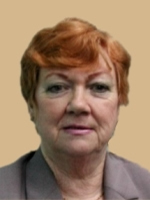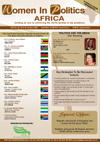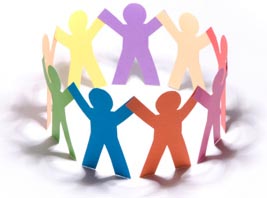The relationship between corruption and gender is an emerging area of analysis and practice in the anti corruption field. Academics and practitioners are only starting to examine the impact of women in governance systems on levels of corruption as well as the ways in which corruption and anti corruption initiatives affect the genders differently.
Since its foundation, GOPAC has tried to ensure that its members have equal opportunity within the organization and access to GOPAC’s resources, information and opportunities for leadership. As GOPAC pursues programming through its Global Task Forces it will also examine the potential and value of gender analysis within the work plans of these task forces. In addition, the GOPAC Board of Directors is in the process of examining a proposed Gender Policy for adoption by the organization.
GOPAC has dedicated this page to being a resource for its members, and others, on information related to the relationship between corruption and gender. We hope to update this site on an ongoing basis with information regarding:
Key Gender Issues Related to Corruption:
Gender shapes opportunities to engage in corruption.
Gender defines the very currency of corruption.
Corruption has different effects on social groups of men and women.
Gender influences how effectively corruption is measured and evaluated.
Gender shapes the dynamics of participation and representation in civil society anti corruption struggles.
Gender and Corruption in Development Cooperation: What do we know from UNDP Experiences
News
GOPAC secretary, Mary King interviewed
 Interview with Mary King, GOPAC secretary, senator and minister of Planning, Economic and Social Restructuring and Gender Affairs of Trinidad and Tobago, conducted by the iKNOW Politics network
Interview with Mary King, GOPAC secretary, senator and minister of Planning, Economic and Social Restructuring and Gender Affairs of Trinidad and Tobago, conducted by the iKNOW Politics network
Also available in Arabic
Women’s Watch: Calendar
UNIFEM: Events & Campaigns
Past Events
The Role of Parliaments in Enforcing Women’s Rights - 15 Years after Beijing
UN Headquarters, New York, 2 March 2010
During the 54th session of the United Nations Commission on the Status of Women (CSW), whose priority theme this year is the 15-year review of the implementation of the Beijing Declaration and Platform for Action (1995) and the outcomes of the twenty-third special session of the General Assembly (2000), and the links with achieving the Millennium Development Goals, the Inter-Parliamentary Union and the United Nations Division for the Advancement of Women (UNDAW) are organising a parliamentary event entitled The Role of Parliaments in enforcing women’s rights, 15 years after Beijing.
The meeting will discuss achievements made at the national level in terms of women’s rights, fifteen years after the Fourth World Conference in Beijing. It will focus in particular on how parliaments have supported change at the national level and what parliamentary mechanisms have been used and can be used to pursue enforcement of commitments made at Beijing. In so doing, the meeting will provide an opportunity to contribute to the debates at the CSW. For more information...
Report on “Gender and Corruption in Development Cooperation Workshop"
Date: 10-11 November 2008
Location: GTZ Headquarter, Eschborn, Germany.
Women in Politics-Africa 2009
28, 29 & 30 October 2009
Indaba Hotel, Fourways Johannesburg, South Africa
 Reasons not to miss this event:
Reasons not to miss this event:
- Removing all obstacles to women's participation in parliament
- Facilitating linkages among elected women in government and rural communities
- Emphasising the importance of putting women in the country's decision making process
- Shattering the hardest glass ceiling of them all-becoming a president for your political party/country
Honduran Women in Resistance on Wednesday, July 22nd, at 10am (local time) in front of U.S. Embassies and other U.S. government institutions across the Americas.
JASS, Hondurans for Democracy, CODEPINK, Women of Color United, and others are organizing a rally that will take place in the District of Columbia (D.C.) in front of the White House this Wednesday at 10am (EST). For more information view the rally flyer, press release, or call our office at 202-232-1211.
If you can't attend, then tune-in to Radio Feminista's live broadcast from the various demonstrations around the world starting at 10 am ET at www.radiofeminista.net.
Gender Equality Incorporate is hosting a gender training with certification workshop in Toronto from October 26-30th, 2009. The five day workshop promises participants the opportunity to:
- Review and solidify your knowledge and understanding of gender equality language and concepts.
- Learn about and apply a wide range of practical tools for projects, programs and organizations
- Gain tangible skills and tips to enhance gender equality work across sectors and regions.
- Take stock of what you and your organization are doing / not doing and create a plan for building on current efforts.
Further information on the training can be found at www.genderequality.ca
Training Course: Making Governance Gender Responsive
The Center for Asia-Pacific Women in Politics, a non-profit organization dedicated to promoting equal participation of women in politics, announces the 9th "Making Governance Gender Responsive" training course, which will be held at the Asian Institute of Management Conference Center in the Philippines on 23-30 July 2009.
Participants will learn how to identify gender biases and formulate action plans promoting gender equality. To maximize the effectiveness of the training, the course will offer a combination of experiential, reflective, participative and deductive approaches. The course is generic and can be adapted to suit the needs of parliamentarians, government official, international agencies’ employees and the like in different countries.
Handbook on Parliamentary Oversight on Gender Equity
This handbook is designed to assist parliamentarians in carrying out their oversight role on gender by developing a better understanding of the concept, providing a summary of the budget cycle process, discussing gender budgeting, and examining the gender dimensions in parliamentary committees, as well as suggestions for changing attitudes as a strategy for achieving gender equality.
Guide for the Formulation of Public Budgets in the Health Sector Using a Gender Perspective (Mexico)
The Guide is a contribution to the task of incorporating gender perspective in the design and formulation of public policy and constitutes one of the first steps in the area of programming and budget planning.
Action for Development (ACFODE) Gender Budget Training Manual (Uganda)
Gender Budget Training Manual created by ACFODE of Uganda to guide trainers who are involved in building capacities of policy makers and other stakeholders at District and Subcounty levels in Gender Budgeting. The overall objective is to ensure that Plans and Budgets at Districts and Subcounties address the needs of disadvantaged groups, especially women.
Gender Budgeting Guidebook (Egypt) [Arabic ONLY]
The Gender Budgeting guidebook was produced by the Public Administration Research and Consultation Centre (PARC) of Cairo University in collaboration with the Egyptian National Council for Women. The guidebook, serves as a useful resource on Gender responsive budgeting concepts, tools and experiences in the Arabic language.
GTZ Manual for Training on Gender Responsive Budgeting
This Manual for Training on Gender Responsive Budgeting was prepared by Katrin Schneider on behalf of GTZ. It is designed for professional gender trainers who are familiar with training methods and gender concepts. It is based on an advanced training course for trainers organized by GTZ’s Gender Advisory Project from 26 July to 7 August 2004 in Nairobi.
IDRC: Gender mainstreaming in poverty eradication and the millennium development goals. A Handbook for policy makers and other stakeholders (2003)
Comparative Analysis of Gender Quotas: A New Research Agenda
When comparatively analyzing gender quotas, Drude Dahlerup emphasizes that results must be examined in both “quantitative and qualitative terms”. Numerous factors have to be considered from several perspectives in order to achieve a credible assessment. This includes but is not limited to perceptions on electoral statistics, intended and unintended ramifications and stigma glass ceilings affecting quotas. Additionally, Dahlerup cautions against statistics based on gender quotas that are derived from distinctly dissimilar political systems as this can cause theoretical methodological problems. Dahlerup questions the conditions under which quotas contribute to the empowerment of women, as well as situations where gender quotas lead to unintended negative effects. Click here for the full paper by Drude Dahlerup (Department of Political Science, Stockholm University, Sweden).
Women's Learning Partnership Releases New Multimedia Leadership Learning Tools in Arabic
The Women's Learning Partnership (WLP) recently released the Arabic edition of Leading to Choices: A Multimedia Curriculum for Leadership Learning, a curriculum that includes a training handbook and three guides that provide interactive, scenario-based activities. Examples of participatory and democratic learning throughout the curriculum enable human rights and democracy activists, educators, women leaders, and facilitators to learn how to implement successful advocacy campaigns, communicate effectively with the media, and train trainers. The Arabic edition is the fourth culture-specific adaptation of WLP's innovative multimedia training package. It will be used in training of trainers programs throughout the Arab world that focus on leadership training, coalition building, messaging, and advocacy relating to women's human rights campaigns. English, French, and Persian editions are also available.
Comparative Analysis of Gender Quotas: A New Research Agenda
When comparatively analyzing gender quotas, Drude Dahlerup emphasizes that results must be examined in both “quantitative and qualitative terms”. Numerous factors have to be considered from several perspectives in order to achieve a credible assessment. This includes but is not limited to perceptions on electoral statistics, intended and unintended ramifications and stigma glass ceilings affecting quotas. Additionally, Dahlerup cautions against statistics based on gender quotas that are derived from distinctly dissimilar political systems as this can cause theoretical methodological problems. Dahlerup questions the conditions under which quotas contribute to the empowerment of women, as well as situations where gender quotas lead to unintended negative effects. Click here for the full paper by Drude Dahlerup (Department of Political Science, Stockholm University, Sweden).
Women in Politics& Decision-making in Southern Africa: A Gendered Political analysis.
An outline of what WiLDAF is about, its structure and its various activities is the opening sermon for this book. Case studies of Malawi, Mozambique, Namibia, and Swaziland provide a comprehensive evaluation of women’s participation in politics and the problems and constraints they face within the political arena. At the end suggestions are given as to how women’s participation can be increased in the region of politics and decision-making. It looks at the role of Ngo’s in relation to development in the areas of human rights, social development, land and education
Rude Accountability in the Unreformed State: Informal Pressures on Frontline Bureaucrats in Bangladesh
Author Naomi Hossein discusses how strong social and local political pressures go some way towards supplying a rough responsiveness to demands for services. These work through shame and embarassment, pressures to maintain reputation and status, and the threat of violence. Poor women may have a particularly strong comparative advantage in using 'rude accountability' as it is comparatively less difficult for them to do so than engage in more formally structures means of complaint or feedback.
Gender and Corruption (U4 Helpdesk)
Provides an overall analysis of the effects of corruption on gender issues. Second, to describe how anti corruption policy can best and most effectively take into consideration gender roles within corruption. Third, to provide examples of how gender influences the nature of corruption to provide examples of how anti-corruption policy can be sensitive to gender.
Quick Entry Points to Women’s Empowerment and Gender Equality in Democratic Governance Clusters (UNDP)
This presentation discusses the lessons learned by the UNDP through their gender and corruption work
Africa-Canada Parliamentary Strengthening Program (ACPSP) Gender Equality Network
Parliamentary Centre: Handbook on Parliamentary Oversight on Gender Equity
Political Cleaners: Women as the New Anti Corruption Force?
Author Anne Marie Goetz disputes the myth that women are less corrupt than men. Using examples from South Asia, Goetz argues that the gendered nature of access to politics and public life shapes opportunities for corruption.
Parliament, the Budget and Gender
This reference tool handbook, available in English, French and Arabic, is the sixth in a series produced by the Inter-Parliamentary Union (IPU) which seeks to advance parliament's own capacity to make a positive impact on the budget, and to equip parliament, its members and parliamentary staff with necessary tools to examine the budget from a gender perspective.
Conventions and Treaties
CEDAW: The UN Convention on the Elimination of all Forms of Discrimination Against Women (1979)
The Convention on the Elimination of All Forms of Discrimination against Women (CEDAW), adopted in 1979 by the UN General Assembly, is often described as an international bill of rights for women. Consisting of a preamble and 30 articles, it defines what constitutes discrimination against women and sets up an agenda for national action to end such discrimination.
Regional and National Research
Latin America and the Caribbean
IKNOW Politics: Consolidated Response On Gender Mainstreaming In The Americas
A consolidated response, based on research conducted by iKNOW Politics staff and Politics Experts, focusing on examples and best practices of gender mainstreaming in economic and social legislation in the Americas.
Expert Opinion: Examples and Best Practices of Gender Mainstreaming in Economic and Social Legislation in the Americas
In the Americas, there have been interesting advances in gender mainstreaming in economic and social legislation. This web page provides some examples from the region.
Budgets and Gender, Mexican Experience: Systematization of the project that Gender Equity: Citizenship, Labor and Family and Fundar: Center for Analysis and Investigation carried out in conjunction with the Ministry of Health
This document explains the results obtained from analyzing both the methodology described in the Guidebook on the Formulation of Gender-Responsive Public Budgets, in the Ministry of Health (2004) and the strategies that were successfully implemented throughout the process in Mexico, in terms of their potential for replication in other sectors of the government.
 The International Knowledge Network of Women in Politics, iKNOW Politics, is designed to increase the number and effectiveness of women in political life by utilizing a technology enabled forum to provide access to resources, expertise, dialogue, and knowledge creation on women’s political participation. iKNOW Politics brings together women involved in politics around the world in order to give them access to valuable resources and advisory services, share interests and experiences, participate in training and development, and network and collaborate on issues of interest. The iKNOW Politics Web site plays a central role in achieving this goal by offering users the opportunity to:
The International Knowledge Network of Women in Politics, iKNOW Politics, is designed to increase the number and effectiveness of women in political life by utilizing a technology enabled forum to provide access to resources, expertise, dialogue, and knowledge creation on women’s political participation. iKNOW Politics brings together women involved in politics around the world in order to give them access to valuable resources and advisory services, share interests and experiences, participate in training and development, and network and collaborate on issues of interest. The iKNOW Politics Web site plays a central role in achieving this goal by offering users the opportunity to:
* Access resources, including the online library and the information and expertise of other users, experts and practitioners;
* Create knowledge through mediated discussion forums, information exchange and consolidated expert responses to member queries; and
* Share experiences by using tools specifically designed to facilitate the exchange of lessons learned and best practices among members of a global community committed to the advancement of women in politics.




